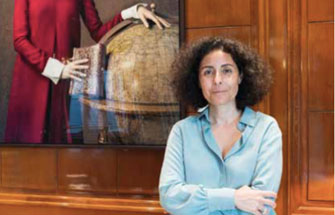Since its creation in 2014, the Monaco branch of Union Bancaire Privée (UBP) has steadily strengthened and is now a major player in the Principality’s financial centre. Responsibility is one of UBP’s core values and the Bank puts sustainability and future generations at the heart of its development model. We met with Sérène El Masri, UBP Monaco’s Site Manager.
Corporate Social Responsibility is part of UBP’s DNA: how long has that been the case, and why?
As a family-owned bank, an understanding of sustainability issues is built into UBP’s very foundations. We are confident that by applying ESG (Environmental, Social and Governance) principles, we can improve risk management and generate alpha. Since 2012, the Bank has been a signatory to the United Nations Principles for Responsible Investment (UNPRI), the worldwide reference in terms of responsible and sustainable investment. In 2018, UBP joined Swiss Sustainable Finance (SSF) and Sustainable Finance Geneva (SFG). The Bank has also become one of the twelve members of the Cambridge Institute for Sustainability Leadership’s (CISL) “Investment Leaders Group”, a select global network of pension funds, insurers and asset managers committed to advancing the practice of responsible investment.
What is your Responsible Investment Policy? What companies do you favour?
UBP’s ESG approach invokes the following four practices: screening, promotion, active ownership and thought leadership.
A firm-wide “Exclusion list” encompasses a number of controversial business areas in which we feel it is inappropriate to invest. This includes companies that sell controversial weapons, derive more than 5% of their earnings from nuclear activities or generate more than 20% of their revenue from the extraction of thermal coal.
We also have a “Sustainability Champions List” of companies identified as either contributing to solving the world’s societal and climate challenges or taking an innovative approach in their efforts to improve their ESG practices. UBP seeks to maintain a constant dialogue between its specialists and these companies.
Wherever possible, we try to use our voting rights in the best interests of our clients and our ESG principles.
You introduced your Positive Impact Equity investment strategy in 2018, which was a tricky time...
This strategy aims to generate superior returns over the long run by investing in companies that, through their products and/or solutions, help to address major social and environmental issues. One of its key features is that it attaches as much importance to measuring companies’ non-financial performance as it does to their financial results. Since 2018, equity markets have been hit by both the China/US trade war and the Covid-19 pandemic, and have suffered the two worst quarters of the last decade. Despite that, the return from this strategy has been highly satisfactory. Our clients also appreciate the fund’s impact in terms of CO2 reduction, wastewater treatment and steel dust recycling.
Is that why you launched an Impact fund focusing on emerging markets in May 2020?
Yes, this is a new strategy that reinforces UBP’s Impact franchise, investing in companies that are helping to solve global problems such as scarce resources, climate change and poverty in emerging market countries.
Do you have a specific governance structure in charge of sustainability?
Yes, it takes the form of two committees: the Responsible Investment Committee (RICO) and the Corporate Social Responsibility Committee (CSRCO). Both report to the Sustainability Board, which reports to the Executive Committee.
The first has the task of defining, implementing and supervising UBP’s Responsible Investment policy. It ensures that the sustainability criteria defined are duly incorporated into our entire investment universe and that the Exclusion, Watch and Inclusion Lists approved by the Sustainability Board are followed.
The CSRCO, meanwhile, is responsible for defining, implementing and supervising UBP’s CSR approach, ensuring that all relevant aspects – environmental protection, human resources and community engagement – are covered.
How does UBP apply its CSR policy in Monaco specifically?
We have signed the Principality’s National Energy Transition Pact, which means that we are committed to taking practical action on waste management, transport and energy. Also, following our recent move to the Belle Epoque building, we have taken the opportunity to extend the scope of our commitments. For example, we have installed LED lighting throughout, all our computer screens go into sleep mode when they are not being used, we have banned plastic and we are recycling all our waste where possible. We are also holding sustainable art exhibitions in our offices every six months. We have partnered with renowned artist agency MTArt, whose artists, through their philosophy or the materials they use, share our values and commitment to sustainability. Our first exhibition opened on 1 July and is fittingly entitled “Hope Ratio”.






